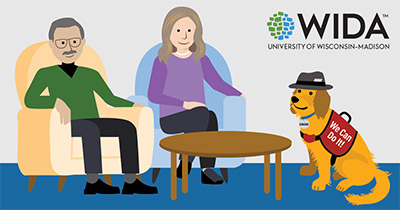Conversations with Candoo: WIDA Alternate ACCESS standard setting

In this news article, Candoo – the WIDA Alternate ACCESS dog – fetches answers to questions about the upcoming Alternate ACCESS Standard Setting Study event. WIDA standard setting experts are paws-itively thrilled to talk about things like what in the world is a standard setting event and how standard setting affects scores and reports.
‘Come’ and meet the experts
Step aside pup-arazzi, so that we can meet our standard setting experts! Throughout this article, Candoo will be asking questions of Laurene Christensen and Gary Cook. Laurene is the director of accessibility research at WIDA. Gary is a senior research fellow at the Wisconsin Center for Education Research working with WIDA. Both Laurene and Gary lead the Advancing ALTELLA project.
‘Find it’ – answers to standard setting questions
Follow along as Candoo asks Laurene and Gary his top questions about standard setting.
This conversation has been lightly edited – sometimes a dog’s gotta bark.
Candoo: What is standard setting?
Gary: Anytime an organization significantly revises an assessment, like we’ve done with Alternate ACCESS, they must conduct a standard setting study. Standard setting is when a group of select, trained educators determine proficiency level scores and set cut scores for an assessment. Cut scores describe the level of student performance needed to meet the expectations of each proficiency level. For example, what scale score does a student need to receive a proficiency level of 2 or 3 at their grade level? Cut scores also help states determine the appropriate level a student must achieve on Alternate ACCESS to be considered proficient in English.
Candoo: Thanks, Gary! If our readers are curious – like I am – about WIDA score terminology, I suggest checking out the Alternate ACCESS Scores and Reports page. As you browse the page, keep in mind that information about 2023–24 Alternate ACCESS scores and reports is coming in fall 2024.
Candoo: When is the Alternate ACCESS Standard Setting Study event? (And paw-lease can I come?)
Laurene: The event takes place July 16–19, 2024. The reason it’s happening this summer is because we need to wait for everyone in the WIDA Consortium to finish testing and for our incredible data analysts to process all that student test data. Even though we’d love for you to be there, Candoo, standard setting is just for humans.
Candoo: I know you all will have a ball without me, Laurene. Anyone interested in participating in other WIDA assessment events can browse the event opportunities on the Building a WIDA Assessment page.
Candoo: Who attends the actual Alternate ACCESS Standard Setting Study event?
Laurene: Educators – some of your favorite humans, Candoo! Specifically, standard setting panelists are English language, content and/or special education teachers, as well as school and district administrators from across the WIDA Consortium. All selected educator panelists are experts who work with students with the most significant cognitive disabilities and are familiar with Alternate ACCESS. Panelists were encouraged to apply by their State Education Agency (SEA) and selected by WIDA experts. Members of the WIDA Executive Committee (state leaders who represent various WIDA subcommittees) and WIDA's Technical Advisory Committee (TAC) will be present to oversee the process, and data experts will be there to analyze data. Staff from WIDA and the Center for Applied Linguistics (CAL) will host and facilitate the event.
Candoo: Thanks, Laurene! I didn’t know what the WIDA TAC is, so I looked it up and discovered that they advise WIDA on the technical quality of our assessments. The WIDA TAC is made up of national and international experts in assessment.
Candoo: What will panelists do during the standard setting event?
Gary: Panelists will start by going through robust training. After that, they will work in four grade cluster groups: K–2, 3–5, 6–8, and 9–12. Within each grade cluster, groups of panelists will evaluate test items throughout many rounds of review and establish proficiency level standards for the Listening and Speaking tests and the Reading and Writing tests.
Candoo: How does standard setting affect Alternate ACCESS scores and reports?
Laurene: Since the standard setting event takes place this summer, 2023–24 Alternate ACCESS scores and reports will be released in fall 2024. I know what you’re thinking: "Candoo, why do your favorite humans need to wait until fall?" After the standard setting event, we need to present our cut score recommendations to the WIDA Executive Committee and create new scoring tables. Once all that happens, we can release scores in WIDA AMS and get reports delivered to district or school sites.
Candoo: Because I love digging for bones... I mean information, I talked to my other friends on the assessment team and was reminded that scores for 2023–24 ACCESS and Kindergarten ACCESS will be released according to regular reporting schedules.
Candoo: What should educators do while they wait for scores and reports?
Laurene: Prior to Alternate ACCESS scores and reports getting released this fall, I suggest that educators
- Get familiar with the brand-new WIDA Alternate Proficiency Level Descriptors. Refer to the Glossary and Text Examples section for definitions of terms and examples of student responses.
- Get a jump start on lesson plans for multilingual learners with the most significant cognitive disabilities by reading through the Advancing ALTELLA Toolkit No. 1: Applying the Framework.
- Brush up on recommended tools and supports for multilingual learners with the most significant cognitive disabilities by perusing the suite of ALTELLA briefs.
- Keep in mind that your state, territory or federal agency may have guidance on how to make program placement decisions about students who take Alternate ACCESS.
‘Stay’ in the know about Alternate ACCESS
The best spot to find information on the redesigned Alternate ACCESS is the WIDA Alternate ACCESS Updates page. On that page, you’ll find things like a list of new resources and new test features, and the WIDA Alternate Proficiency Level Descriptors.





